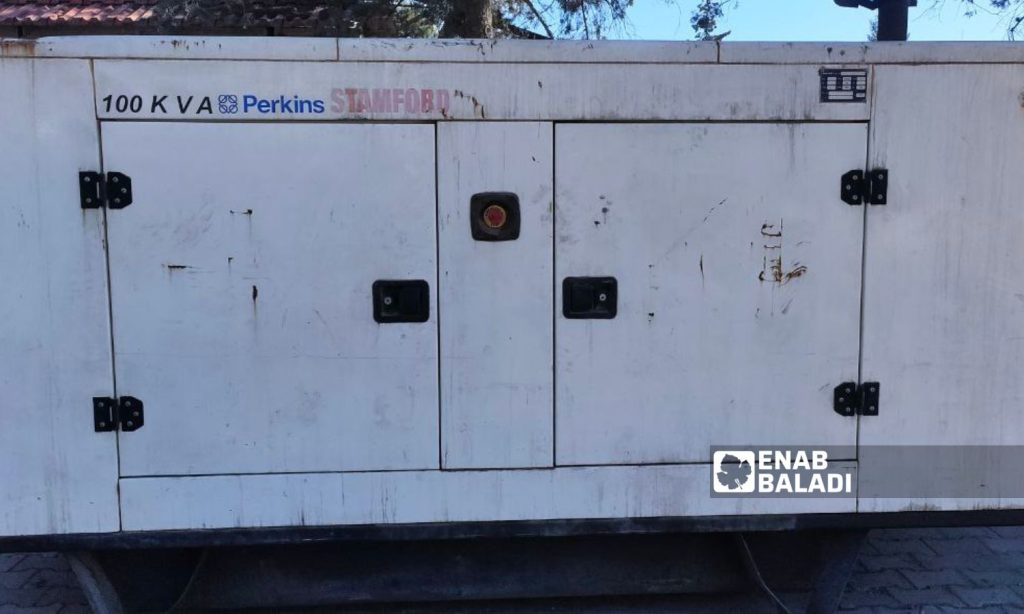Enab Baladi – Qamishli
Owners of private electric generators have informed the residents of the northeastern city of Qamishli that the subscription price for one “ampere” unit has risen to about 10,000 Syrian pounds instead of 7,000 as of the beginning of April.
From time to time, generator owners increase the prices of ampere subscriptions without an official decision, but with the tacit approval of the Autonomous Administration of North and East Syria (AANES), under the pretext of incurring losses with the continued deterioration of the value of the Syrian pound.
| Ampere is a well-known local name for generator electricity in Syria, which citizens rely on in light of the electricity cuts in various Syrian regions. Its price is linked to the price of diesel, as the owners of electric generators depend on it to operate the generators. |
Agreement with AANES
A local source, who owns a private electric generator in Qamishli, told Enab Baladi that an agreement was reached with the Autonomous Administration to raise the selling price of the ampere by 1,000 pounds, to become 8,000 pounds instead of 7,000, in exchange for an 8-hour run, as of early April. Enab Baladi could not verify such information.
The source, who declined to be named for special reasons, added that the agreement with the subscribers to increase the operating period raises the price of the one-ampere unit to 10,000 or 12,000 Syrian pounds according to the duration of the increase.
The source considered that this increase is “necessary” due to the continuous deterioration in the value of the Syrian pound, the high costs of maintenance, repair, and oils, and the high cost of spare parts, all of which are paid “exclusively in dollars,” adding that the matter is not related to the provision of fuel by the AANES.
On January 5, the municipalities of Qamishli and the northern district of al-Hasakah set the price of one ampere for neighborhood generators that operate for eight hours at 7,000 Syrian pounds per month without yet announcing the price adjustment.
No reason for raise
Qamishli-based Majdal Ameen, 55, told Enab Baladi that there is no justification for raising the price of the ampere subscription, as fuel prices are fixed, and the Autonomous Administration is still providing diesel for generator owners at the agreed-upon price.
Ameen cannot bear the burden of the increase, like most people with limited incomes, adding that the decision to raise the subscription price may force him to reduce the number of ampere units he subscribes to, despite his urgent need for electricity.
He called for the need to impose more control on the owners of electric generators, who exploit the need for electric current to achieve more profits.
The residents of Qamishli and the rest of the AANES-held areas rely on subscribing to private generators distributed within the neighborhoods to secure electricity sources due to the power outage from the main network for 22 hours, and sometimes the outage lasts for several days, which causes many problems for the majority of the residents.
It is difficult to operate some electrical appliances on amperes, such as automatic washing machines, electric heaters, and water heaters, which require a minimum of eight “amps,” while most residents subscribe to only three amperes, commensurate with their financial capacity.
The absence of electricity leaves the residents of the region vulnerable to ampere dealers monopolizing the service and controlling its prices without the Autonomous Administration having an effective oversight role in this context, as it always responds to the demands of generator owners to raise the prices of amperes from time to time under the pretext of high costs.
Al-Hasakah governorate relies on two sources of electric energy, the first is water from the Euphrates and Tishreen dams.
The second is from the Suwaidiyya, al-Jibsah, and Rmeilan power stations that operate on natural gas, and are dedicated to strategic facilities such as mills and pumps of oil wells, and military installations belonging to the Syrian Democratic Forces (SDF) and the Syrian regime, with limited benefit for the Qamishli neighborhoods.











